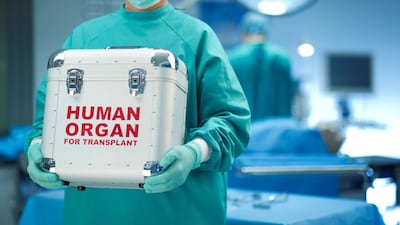During his talk at an event this month celebrating the release of his most recent book, Egyptian author and television presenter Khaled Montaser told his audience that he wanted to change the subject. He wanted to take a few moments to raise awareness for a cause close to his heart – organ donation. Dr Montaser, who is also head of dermatology at the Suez Canal Authority Hospital, knows better than most how critical such donations are to public health. After all, it is estimated that one deceased organ donor can save up to eight lives.
And yet, throughout the Middle East, securing enough donors to meet the needs of prospective recipients has long been an uphill battle. Many countries in the region have advanced healthcare systems with the infrastructure required to handle transplants, but social, cultural and sometimes legal obstacles suppress donation rates.
Throughout the region, one concern for policymakers is the potential for organ donation to become linked to organised crime. Such fears are not entirely groundless; with a high population of refugees and people living in poverty, some parts of the Middle East are global hotspots for human trafficking, and the organ trafficking that often comes with it. To minimise the risk of organs falling into the wrong hands, many countries have strict laws restricting the donation of organs from living donors to relatives, and require family consent for the organs of deceased donors.
But a greater problem is social stigma. As The National reported in May, authorities in the UAE have put considerable effort into combatting misconceptions, including a widespread one that Islam prohibits organ donation; in fact, as many respected Muslim religious scholars have emphasised, it does not.
In countries where family consent is required, relatives of deceased donors are often squeamish about the idea of their relative’s body going into the ground not fully intact. The impact of this can be significant. Turkey, for instance, has the highest rate of organ transplants from living donors in the world. But when it comes to donation from the deceased, which requires the consent of a spouse or first-degree relative, the country ranks very low on global tables.
But there is cause for optimism. Concerted public awareness efforts, when combined with legal reforms, do work. In the UAE and Saudi Arabia, where prospective donors can decide for themselves what happens to their organs after their death, donation rates are increasing. This month alone, an Abu Dhabi hospital performed 10 transplants – a record number. An Indian family residing in Dubai received a personal thank you from the emirate’s Crown Prince, Sheikh Hamdan bin Mohammed, when their decision to donate their deceased two-year-old son’s organs saved the lives of three other children in the Emirates and Saudi Arabia. And earlier this year, an unprecedented “three-way transplant” between the UAE and Israel, involving living donors in both countries.
Even with such milestones, demand for organs in all countries of the Middle East continues to outpace supply. But some parts of the region are setting a good example for others, public awareness is growing and policymakers are waking up to the fact that when it comes to organ donation, saving lives requires much more than finding the right match.


